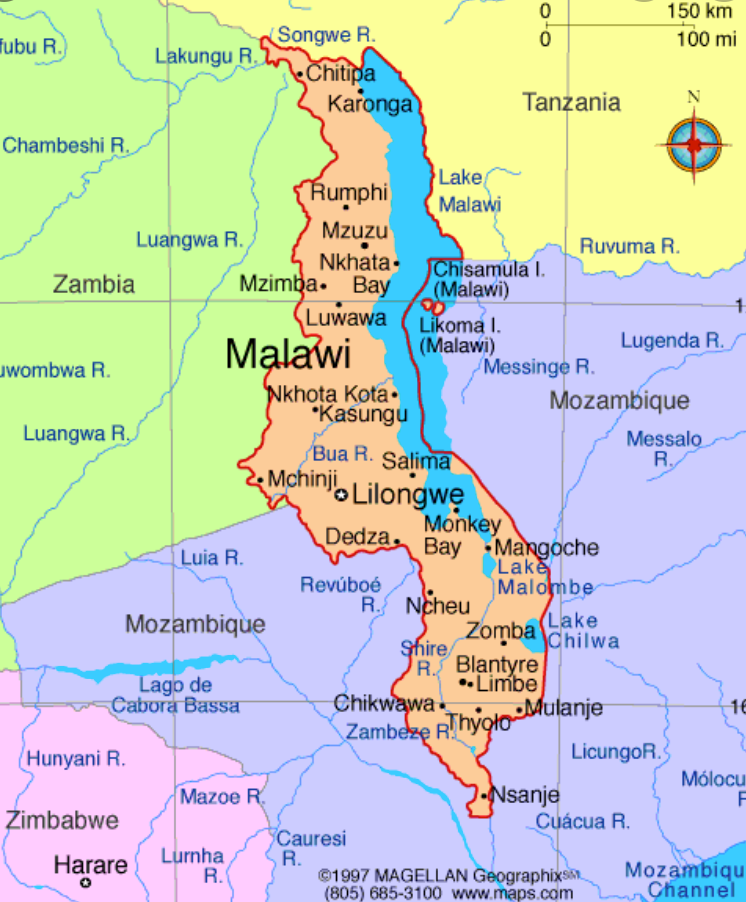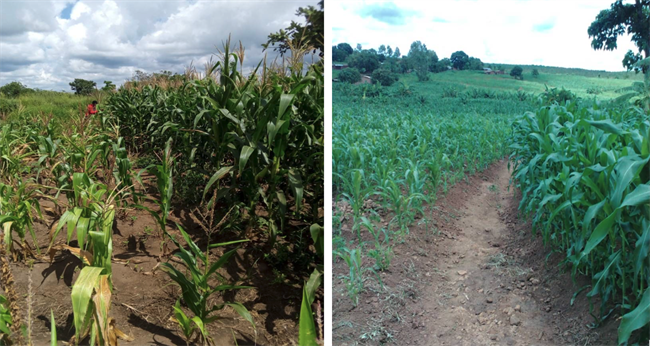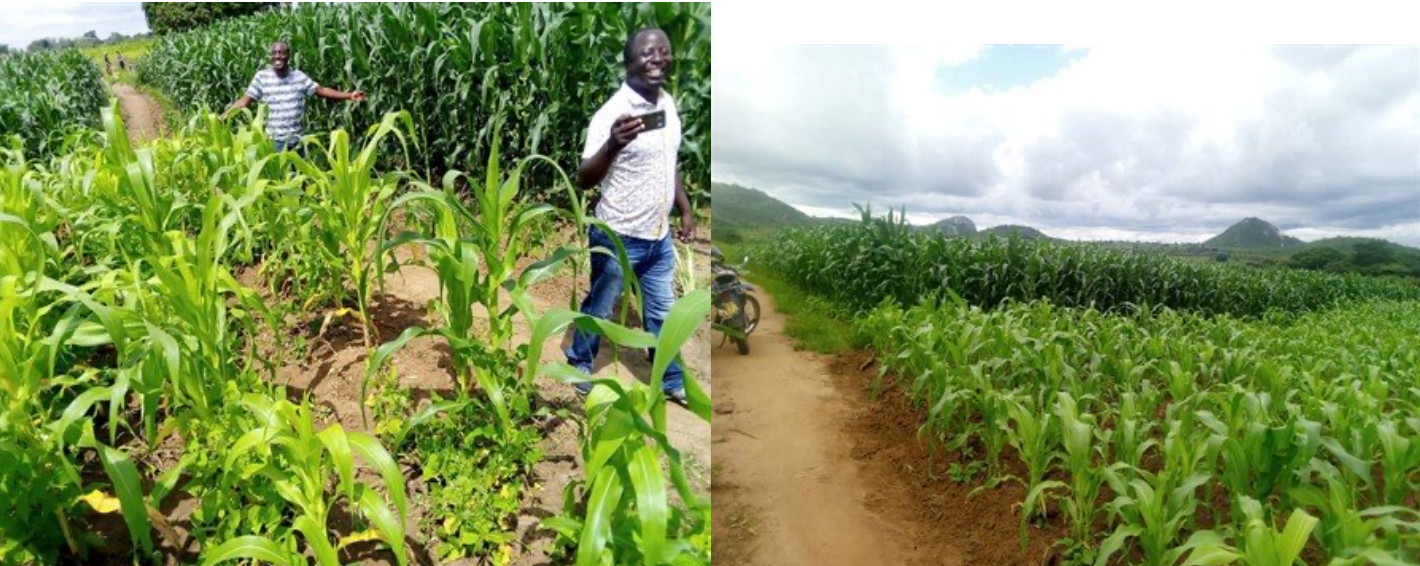What is Tiyeni?

Tiyeni is a Malawian NGO with a UK funding arm. We show farmers how to improve their crop yields, using an extremely low-cost, low-technology set of methods that we have pioneered. It is an advanced and highly effective form of Conservation Agriculture (CA).
Our results have been spectacular - typically doubling and often tripling crop yields from one harvest to the next. These results are sustained and even improved over time as we build healthy soils.
We do not rely on incentives and inputs to promote adoption of our methods: instead, we respond to demand for our farming technology. Word is spreading so fast that we cannot keep up with demand from farmers for training.
Tiyeni means "Let's Go!" in Chichewa, Malawi's most widely spoken language.
Deep Bed Farming
Our core activity is to train Malawians to use Deep Bed Farming (DBF), an innovative farming technology that we have developed over several years of trial and error.
DBF involves first using a pickaxe to break up hard compacted layers of earth several inches under the ground, which are prevalent across large areas of Malawi. Breaking the hard pan allows roots, water and air to penetrate more deeply underground, and helps the soil retain moisture long after the rains, instead of running off immediately after rainfall and causing devastating soil erosion.
To this (already transformational) method we harness other healthy farming practices, such as good composting, cover crops, mulching, contour planting and crop rotation. Whereas artificial fertiliser may feed the plants, our methods nurture the soils.
Once the hard pan has been opened with the pickaxe, the Deep Bed method means that the soil is never trodden again. This prevents the compacted layer from re-forming, so the gains are preserved and even reinforced over time, as healthy organic soils steadily develop. DBF then becomes a highly effective and sustainable form of climate-friendly Conservation Agriculture, with minimal or zero tillage.
The images here show crops from traditional maize farming methods, next to crops grown with our Deep Bed methods.


In each case, the Tiyeni crops are taller and darker green. These results are repeated routinely, across a variety of slopes and soils.
To read more about Deep Bed Farming, please click here. To read about our results, please click here. We also invite researchers to visit our projects in Malawi to study our methods and impacts!
Our background
Tiyeni started in 2004 and by 2012 the prototype had been trialled and adapted successfully in several different locations. We began live operations in 2013 with 38 farmers in four villages.
The demonstration effect generated huge demand from farmers to try out the technology and it began to spread fast. By early 2020 almost 15,000 farmers had received training directly from Tiyeni staff, from our Lead Farmers training others in their communities, or had simply learned from and copied their neighbours. The numbers have continued to grow exponentially.
Since our methods do not rely on widespread hand-outs, they are not only low-cost and more sustainable too: and they start with the right incentives. We believe our approach is likely to be useful in large areas of Malawi and beyond, though there are as yet no relevant studies available to show where our methods are likely to be most effective.
Our long-term goal is to introduce Deep Bed Farming across Southern Africa wherever the climate, agricultural requirements and socio-economic conditions make it appropriate to use. Read our strategy for details of how we aim to continue to be successful over the next four years.
Why has this not been done before?
Farmers and others describe Tiyeni's methods as plain common sense. Many people ask why our methods have not been deployed before.
In fact, nearly all the components of DBF have been tried before - though rarely as a combined package. Most of our methods are a form of Conservation Agriculture, though we also insist on breaking up the hard pan first, to allow the methods to work effectively. However, we have also developed key refinements that may not have been used before, such as the particular design of the deep beds. More answers to this question can be found on our history page, which lays out a longer and more subtle story.
Our potential climate change impact
Tiyeni's methods help farmers deal with the effects of climate change, by making crops and soils more resilient and retaining and storing water underground far more effectively during hot and dry periods.
However, there is also evidence that soils, properly treated and respected, can directly help mitigate climate change too. They can absorb and store large amounts of carbon, extracted from CO2 in the atmosphere, via the plants and other organisms they support. Plant cells in leaves, stems and roots are built from carbon, and when the roots penetrate more deeply into the soil, which is the fundamental aim of Tiyeni's farming practices, they carry carbon down with them where it stays underground. Furthermore, we encourage farmers to use plant residues as mulch and as organic matter to feed back into the soil, rather than burning them off according to traditional practices.
While we are not climate scientists, we believe our methods can have a major positive effect on the climate. You can find out more about soils and carbon capture here or here.
Our structure
The Tiyeni Organisation (Limited) is the operational arm of Tiyeni and registered as a local non-governmental charitable organisation in Malawi. It is run from a small headquarters in Mzuzu in Northern Malawi, by a team of local Malawians, supported by Tiyeni in the UK.
The Tiyeni Fund charitable trust no. 1113274 was set up and registered with the UK Charity Commission in 2005, by life-long residents of Malawi who worked with rural communities for many years.
In April 2021, Tiyeni was confirmed as a UK Charitable Incorporated Organisation, no. 1194177. Thank you for your patience whilst we make the transition to this new operational model. The updated charitable objectives, spanning the whole of Malawi and neighbouring countries, can be viewed on Tiyeni's Charity Commission webpage and reflect the ambition of our organisation.
Financials
A UK registered charity, we rely entirely on donations to fund our work in Malawi. Our UK expenditure is kept to a minimum in order to channel funds to where they are needed most: in Malawi.
You can read published data about our financials for the last five years on the Tiyeni Fund's Charity Commission webpage. Our trustees' report and accounts set out our key achievements and the full audited accounts for the year.
Download the 2021/22 Trustees' report and accounts (PDF)
About Malawi
Malawi, with a population of nearly 20 million people, is one of the world's poorest countries. The continuing degradation of the countryside in general and of the soil in particular constitutes a serious, long-running national crisis. A 1997 World Bank study of agriculture in Malawi and a separate report by the United Nations' Food and Agriculture Organisation (FAO) have estimated that the rate of soil erosion in many parts of Malawi to be far in excess of the rate that is required to keep the soil in a good and productive condition. Tiyeni is helping stop the erosion, and rebuilding Malawi's potentially very fertile soils.
See our impacts!
Our Research Page provides a range of studies, facts and figures.